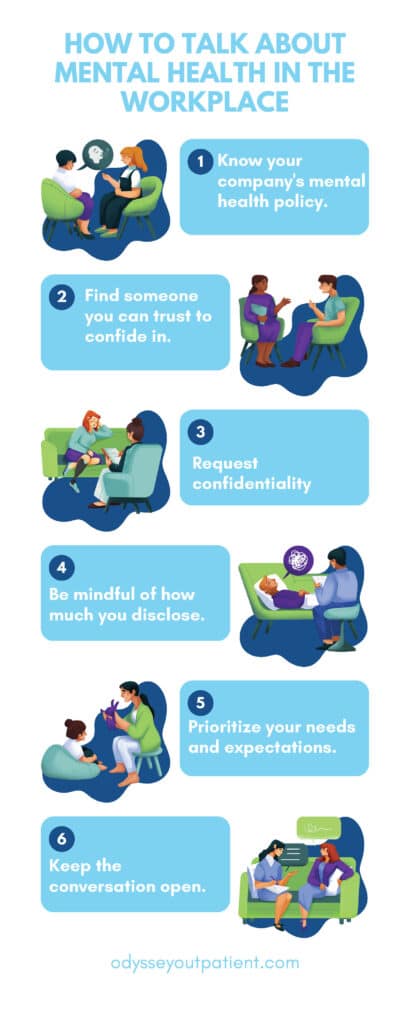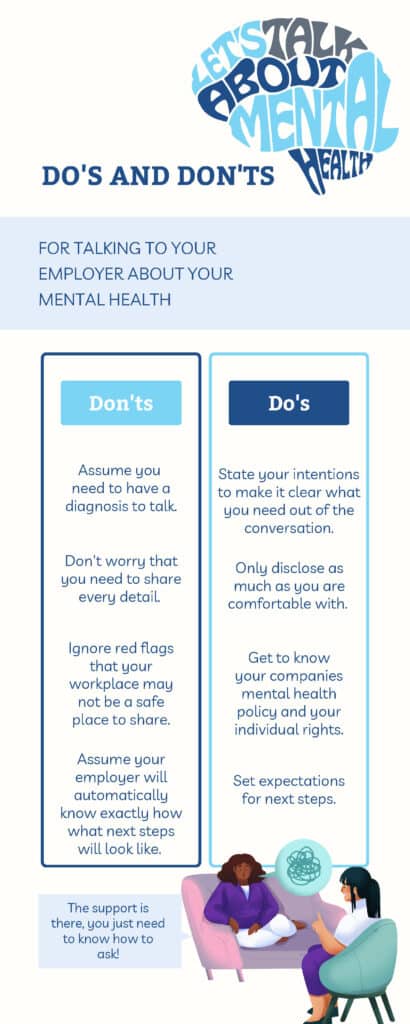Talking to Your Employer About Your Mental Health
Home / Talking to Your Employer About Your Mental Health
Up to 80% of people will experience a diagnosable mental health condition over the course of their lifetime, whether they know it or not. Regardless of status, nearly 60% of employees have never spoken to anyone at work about their mental health status.
Navigating mental health concerns in the workplace can be overwhelming. Not only are you combatting the stigma surrounding mental health, but understanding which options are available to employees is typically unknown territory. So now what?
Do your homework:
An excellent way to approach your employer with confidence is having a clear understanding of the resources available to you. For instance, does your work offer an employee assistance program? An employee assistance program (EAP) is a work-based intervention program designed to assist employees in resolving personal problems that may be adversely affecting the employee’s performance, such as relationship challenges, financial or legal problems, wellness matters and traumatic events like workplace violence. Programs are delivered at no cost to employees by stand-alone EAP vendors or providers who are part of comprehensive health insurance plans. Typically, this information can be found under the “benefits” section of a company handbook or can be requested through an HR department.
You may also have protection under the American’s with Disability Act (ADA) and ADA Amendments Act (ADAAA). The ADAAA defines disability as a physical or mental impairment that substantially limits one or more major life activities. When job applicants or employees have a mental health condition that meets these criteria, they have workplace rights under the ADA and ADAAA. Additionally, mental illness may qualify as a serious health condition under the Family Medical Leave Act (FMLA), which provides job-protected leave to address mental health conditions (U.S. Department if Labor, 2023).
Examples of reasonable workplace accommodations may include:
- Altered break and work schedules — for example, scheduling work around therapy appointments.
- Quiet office space or devices that create a quiet work environment.
- Changes in supervisory methods, such as written instructions from a supervisor that usually does not provide them.
- Specific shift assignments.
- Permission to work from home.
- Changes to workplace policies, procedures, or practices.
When entering into any discussion where you are asking your employer for help, it is important to remember that employers want to partner with employees and offer as much support possible so their team can operate as effectively as possible. At the end of the day companies are a business and struggling employees decreases productivity. Additionally, hiring a replacement is often more expensive than working with existing staff through their mental health journey.
Approaching the conversation:
While not every company has one, typically the first step is to talk to you someone from your human resources department. If you don’t have access to a human resources professional, find someone within the organization that you trust well enough to confide in. Within this discussion always request confidentiality. Confidentiality is expected when speaking to human resources but may not be implied when broaching the conversation with another member of management or colleague.
Now that you have found your confidant, take time and be thoughtful about what you are disclosing and how. Not every company is created equal, and you may want to be mindful about how you approach this topic. Also, remember that one person’s response is not always a clear reflection of a company. Do not be discouraged if your first discussion does not go as planned.
Being upfront about your mental health helps to create an honest and open environment around you. Disclosing your struggles can actually be a great form of relief, too. In many cases, once you open up about your mental health issues you may no longer feel like you’re dealing with this alone and provisions can be put in place to help you reach a better state of mind. Remember that managers are humans too, they may be responding out of their own stress and workload, but typically you will find that your employer will empathize with what and you are struggling with and likely want to help.
Frequently Asked Questions
It’s illegal to be discriminated against because of your mental health, and the law also allows for you to be appropriately accommodated. You should not be penalized for opening up.
Programs like FMLA are unpaid, however, whether your company will provide full or partial salary during a medical leave will depend on their specific policy.
Most EAP programs and medical leave policies protect full-time employee, this includes health insurance.
It is illegal to be discriminate against someone’s mental health, however, not every company views mental health as equally important. Be mindful of how much you disclose and how you approach the conversation.
No, your medical information is confidential.
Even if your job is protected, the potential effects of medication may impact your ability to do the same job. This will need to be an ongoing conversation with your physician as well as your employer.
Legally your medical information is confidential, however, depending on how you disclose it and with who, your company may have a different policy. Just remember that you can always request confidentiality.
Please note, the information provided is not intended to constitute legal advice, medical advice, or any other advice of a professional nature. The content addressed should not be used as a substitute for professional advice.
Start Your Journey
We have a growing number of locations across the country. Click here to find a location nearest you.

